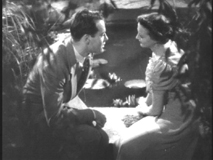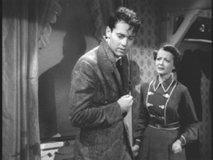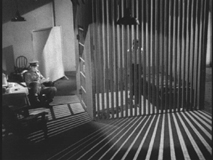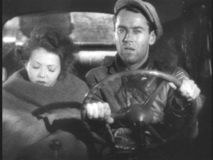You Only Live Once (Fritz Lang, 1937)
 You Only Live Once,
one of the finest films from Fritz Lang, one of the finest directors ever to set
foot in Hollywood, moves with the same political acuity and sureness of intent
as his masterful Fury. The plot
entails the persecution of Eddie (Henry Fonda) an ex-con and repeat offender
whose guilt is presumed by everyone, with the exception of his faithful
girlfriend Joan (Sylvia Sidney). When added to Lang’s oeuvre, it ratifies the
notion that the only justice that Lang believes in is poetic justice.
Society’s blanket attempts to impose it on itself feels like folly in his
films. Told with a timeless sensibility, the film always seems to be searching
for truths, and emerges as a parable of a flawed society. Though the
protagonists here are certainly three-dimensional characters, one gets the
impression that in Lang’s eyes, their belief in the system might be their
greatest flaw.
You Only Live Once,
one of the finest films from Fritz Lang, one of the finest directors ever to set
foot in Hollywood, moves with the same political acuity and sureness of intent
as his masterful Fury. The plot
entails the persecution of Eddie (Henry Fonda) an ex-con and repeat offender
whose guilt is presumed by everyone, with the exception of his faithful
girlfriend Joan (Sylvia Sidney). When added to Lang’s oeuvre, it ratifies the
notion that the only justice that Lang believes in is poetic justice.
Society’s blanket attempts to impose it on itself feels like folly in his
films. Told with a timeless sensibility, the film always seems to be searching
for truths, and emerges as a parable of a flawed society. Though the
protagonists here are certainly three-dimensional characters, one gets the
impression that in Lang’s eyes, their belief in the system might be their
greatest flaw.
 Though You Only Live
Once is smaller in scale than Lang’s silent epics, there’s a certain
grand audacity present in the film’s machinations. It can be found Joan’s
character arc, which takes her from being the secretary of the district attorney
to being a petty fugitive. There’s a palpable sense of injustice in the in
idea that the desperate criminality that finally conquers Eddie and Joan is
created by their desire for justice. He uses several characters as mouthpieces
to present a debate as to what actions are appropriate in this scenario, then
pushes the film headlong into a tragedy, which he mourns (in a truly audacious
final voiceover) so that his point of view seems most correct. The plot relies
upon contrivance, but it’s those contrivances that make the plot possible, and
it’s only because his plot twists upon itself that it manages to address so
many sides of its own argument.
Though You Only Live
Once is smaller in scale than Lang’s silent epics, there’s a certain
grand audacity present in the film’s machinations. It can be found Joan’s
character arc, which takes her from being the secretary of the district attorney
to being a petty fugitive. There’s a palpable sense of injustice in the in
idea that the desperate criminality that finally conquers Eddie and Joan is
created by their desire for justice. He uses several characters as mouthpieces
to present a debate as to what actions are appropriate in this scenario, then
pushes the film headlong into a tragedy, which he mourns (in a truly audacious
final voiceover) so that his point of view seems most correct. The plot relies
upon contrivance, but it’s those contrivances that make the plot possible, and
it’s only because his plot twists upon itself that it manages to address so
many sides of its own argument.
 Throughout You Only
Live Once, watching as society thwarts Eddie’s attempts to reform is
frustrating, but a genuinely inspired twist sets off the third act, and sets the
movie into a spiral of moral ambivalence that only enhances its excitement. When
the authorities learn of the wrongly accused man’s innocence, Eddie suspects
everyone, including a preacher, of deceit because he’s been wronged before.
Lang’s ability to make Eddie’s crisis of faith literal is both moving and
perceptive. Forced to go on the run, the couple is accused of crimes that they
didn’t commit and as that happens, the bounty on their head goes up and the
law’s grip on them tightens. At the same time, they are guilty of some
misdeeds, so mere forgiveness is an inadequate response. While there might be
something troubling about the movie’s decision to rally behind the
self-righteousness of its anti-hero (who has indeed committed many wrongs),
there’s little to criticize about Lang’s expert execution in realizing the
picture. If Lang doesn’t find the right answers here, it’s admirable that he
is spending more energy looking than most people.
Throughout You Only
Live Once, watching as society thwarts Eddie’s attempts to reform is
frustrating, but a genuinely inspired twist sets off the third act, and sets the
movie into a spiral of moral ambivalence that only enhances its excitement. When
the authorities learn of the wrongly accused man’s innocence, Eddie suspects
everyone, including a preacher, of deceit because he’s been wronged before.
Lang’s ability to make Eddie’s crisis of faith literal is both moving and
perceptive. Forced to go on the run, the couple is accused of crimes that they
didn’t commit and as that happens, the bounty on their head goes up and the
law’s grip on them tightens. At the same time, they are guilty of some
misdeeds, so mere forgiveness is an inadequate response. While there might be
something troubling about the movie’s decision to rally behind the
self-righteousness of its anti-hero (who has indeed committed many wrongs),
there’s little to criticize about Lang’s expert execution in realizing the
picture. If Lang doesn’t find the right answers here, it’s admirable that he
is spending more energy looking than most people.
 Several stunning set pieces are present in You
Only Live Once, with a gas grenade attack at a bank robbery taking top
honors. With a gritty yet sentimental tone, Lang manages to convey both the
feelings of his leads and the responses of the world around them. There’s
unusual sensitivity toward exhibited by Lang toward the protagonists. Even
though he’s operating with more information that any of the characters in the
film, there’s never a sense of scorn or condescension in his shot selection. A
brief exchange at one point where a character romanticizes them, saying that
Eddie and Joan are “probably hiding somewhere, having a swell time.” Lang
critiques such glorification of them by immediately cutting to a shot of them
driving through an intense rainstorm, still very much on the run. His usual
expressionistic touches are near the heights of their intensity here. Rain
falls, fog swirls, and shadows impose themselves almost as insistently as
Lang’s camera does. The director came to America as an expatriate from
Germany, and he delivers in his early American films the same tone that would
later come to be termed film noir. Though it is probably a lesser work overall, You
Only Live Once is to its genre what M is
to the serial killer genre. It stands as a clear precursor for such revered
love-on-the-run films as Bonnie and Clyde,
Badlands and They Live By Night, but is perhaps better than any of them.
Several stunning set pieces are present in You
Only Live Once, with a gas grenade attack at a bank robbery taking top
honors. With a gritty yet sentimental tone, Lang manages to convey both the
feelings of his leads and the responses of the world around them. There’s
unusual sensitivity toward exhibited by Lang toward the protagonists. Even
though he’s operating with more information that any of the characters in the
film, there’s never a sense of scorn or condescension in his shot selection. A
brief exchange at one point where a character romanticizes them, saying that
Eddie and Joan are “probably hiding somewhere, having a swell time.” Lang
critiques such glorification of them by immediately cutting to a shot of them
driving through an intense rainstorm, still very much on the run. His usual
expressionistic touches are near the heights of their intensity here. Rain
falls, fog swirls, and shadows impose themselves almost as insistently as
Lang’s camera does. The director came to America as an expatriate from
Germany, and he delivers in his early American films the same tone that would
later come to be termed film noir. Though it is probably a lesser work overall, You
Only Live Once is to its genre what M is
to the serial killer genre. It stands as a clear precursor for such revered
love-on-the-run films as Bonnie and Clyde,
Badlands and They Live By Night, but is perhaps better than any of them.
89
08-05-03
Jeremy Heilman